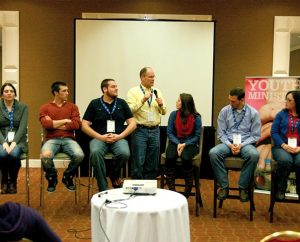How does the church care for and nurture faith in young people coming into adulthood, who today are “under the spell of hyper-individualism, moral relativism, consumer capitalism and nonjudgmentalism?”
Through forming and nurturing Christ-centered relationships, according to participants in Youth Ministry 2014 — the Jan. 9-11 symposium sponsored by LCMS Youth Ministry in St. Louis.

Targeting LCMS church workers who serve youth and young adults, the annual symposium presented the findings of Lost in Transition: The Dark Side of Emerging Young Adults – a book by Dr. Patricia Herzog and Hilary Davidson that documents the third wave in the National Study of Youth and Religion (NSYR).
Herzog is an assistant professor at the University of Arkansas, in Fayetteville, Ark., and Davidson is a Ph.D. candidate at the University of Notre Dame, South Bend, Ind.
Initiated in 2002, NSYR is a longitudinal study that has interviewed the same group of young people three times, exploring their emerging lives throughout the duration of the study. A fourth wave of that study is due to begin soon.
As the authors presented their findings at the symposium, Tom Couser, a retired director of Christian education from Farmers Branch, Texas, provided a Lutheran response to the study. Couser also has served as a high-school counselor and basketball coach and is the author of Passing the Torch: Sharing Faith and Values with the Millennial Generation.
Dr. Craig Oldenburg, director of Children’s Ministry at Immanuel Lutheran Church in Loveland, Colo., facilitated symposium table discussions for participants to explore what congregations can do to be in ministry to and with emerging adults.
The symposium concentrated on the newly-identified life stage known as “emerging adulthood” — a period between adolescence and adulthood, generally including those in the 18-34 age bracket.
In his introductory remarks, LCMS Youth Ministry Director Rev. Dr. Terry Dittmer noted that traditionally there are five stages of becoming an adult. They are 1) finishing school, 2) getting a job, 3) leaving parents’ homes, 4) marrying and 5) having children.
“Achieving these five stages has historically taken place in a person’s early 20s,” Dittmer said. “Now every marker is coming later and later – even into the early 30s.”
NSYR data found that today’s emerging adult is “under the spell of hyper-individualism, moral relativism, consumer capitalism and nonjudgmentalism,” Dittmer indicated. “The impact of these things in their lives too often results in confusing moral reasoning, routine intoxication, materialistic life goals, regrettable sexual experiences and disengagement from civic and political life.”
“Emerging adulthood is a time of postponing options, keeping options open [and] not putting down roots … despite a strong desire to put down roots,” Davidson noted. “Many are searching for meaning and a life purpose. Despite routine intoxication and harmful sexual experiences that can provide diversion, in the back of their minds most wish they had a better sense of who they [are] and their purpose or meaning.”
Couser pointed out in his response that it should not be assumed that emerging adults initially want anything to do with church members or churches.
“You have to earn the right to be heard,” he said.
Herzog echoed Couser’s observation. “Start with listening, not telling,” she said. “Once they think you understand their story and complexity of what they’re dealing with, then they might trust you to help them sort through it together.”
Although not originally on the symposium agenda, a spontaneous panel of emerging adults among the 101 participants offered insights.
Dittmer said that “perhaps the most significant thing that has kept them connected to God, faith and church is the significant adults who have populated their lives.
“Over and over,” he continued, “the speakers, emerging-adult panel and participants in general cited relationships as key to encouraging young adults in their faith formation and connection to the church.”
“It’s about relationships,” agreed the Rev. George Morris, a YM 14 participant from Bay City, Mich. “They want to know. They want to be known. They want the opportunity to share with you, to learn with you, to have opportunities to delve into deeper topics of faith that they don’t get the opportunity to ask about. So, it’s taking the time to build that relationship.”
Carry Ramel, a youth director of Peace Lutheran Church in Beaver Dam, Wis., said, “One thing I take from this conference is learning that we don’t need all the bells and whistles. We just need relationships.”
“It was an amazing conference grappling with a difficult subject,” Dittmer concluded. “We’re talking about young adults, many of whom have left our congregations. We must remember that it’s not so much about refilling our pews as it is about the salvation of the souls of young adults. That’s why we are here. How do we share the Gospel of Christ with these emerging adults? It’s quite a challenge.”
Updated Feb. 11, 2014
Editor’s Note: This story, as it appeared on Page 11 of the February 2014 print Reporter, contained a number of technical glitches that led to quotation marks and dashes being deleted. Reporter has addressed this issue with the printer.





The photo caption refers to six “emerging adults” but the photo is cropped to show only five–and only five names are given. Originally the photo included Laura Davis of Lutherans for Life/Y4Life. What’s going on?
Greg, thank you for letting us know. Please know that the photo was cropped to fit the space allotted by the Web content management system. A notation was included in the photo caption to explain that Laura was a panelist. The image will be re-posted so as to try to include all six panelists.
For those of us who did not attend the symposium, is there a way to access the findings in order to help us in our work in the parishes?